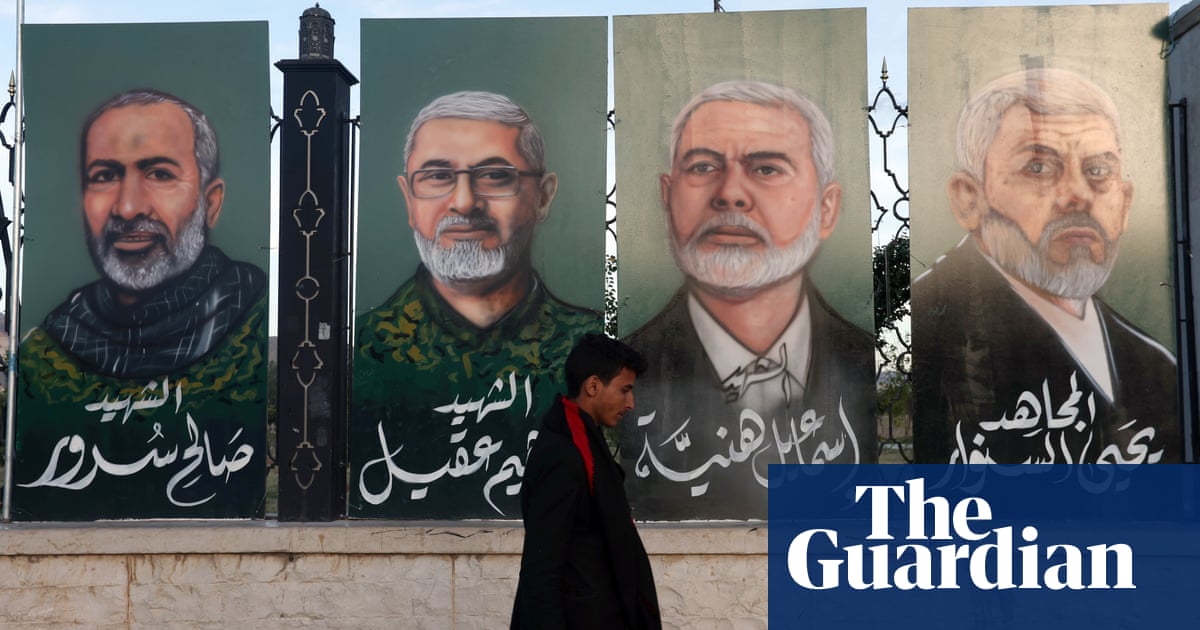The death of Yahya Sinwar, the head of Hamas and mastermind of the 7 October attacks, has huge implications for the conflict in Gaza, for Israel’s other campaigns in Lebanon and the occupied West Bank, and for Israel’s domestic politics.
There will be the war – or wars – before the killing of the 62-year-old veteran militant and the war(s) after it.
One of the biggest immediate impacts will obviously be on Hamas, which has now lost much of its top leadership. Already the head of its military wing in Gaza, Sinwar took charge of the organisation after Ismail Haniyeh, his predecessor, died in a bomb explosion in a government guesthouse in Tehran in July that was blamed on Israel. Other senior officials were killed in Beirut and in Gaza, where Israeli airstrikes successfully targeted military Hamas commanders such as Marwan Issa and Mohammed Deif.
Hamas will portray Sinwar as a martyr and look to frame his death in a way that will inspire new volunteers. That he appears to have died fighting on a frontline, with a weapon in his hand, will help this. But whatever the propaganda, the elimination of such a respected leader is unlikely to boost recruitment, and Hamas sorely needs new manpower in Gaza where it has taken heavy casualties.
Command in Gaza is likely to pass to Sinwar’s younger brother, Mohammed, 49, who will probably continue the strategy of low-level insurgent resistance to Israel, with a focus on retaining some kind of shadow administrative control in the territory and exploiting international outrage over civilian casualties to put pressure on Israel.
But more broadly Hamas will be thrown into disarray. It will now have to find a new overall leader. Sinwar, despite all the authority he had gathered over decades, was a controversial choice and though the succession of his brother would send a powerful message, Mohammed Sinwar would struggle to unify and rally the organisation. Major strategic choices postponed by the appointment of Yahya Sinwar will now have to be made, under great pressure and in the full knowledge that the Israeli security services are capable of tracking and killing even the most senior officials.
In Israel, where Benjamin Netanyahu is still blamed by many for the security failures that led to the death of 1,200 people, mostly civilians, and the abduction of 250 in the 7 October attacks, Sinwar’s killing will greatly reinforce the prime minister’s political position and rally his hardline rightwing support base. Netanyahu’s poll ratings were already improving after a series of tactical successes in Lebanon, including the assassination of Hezbollah’s leader Hassan Nasrallah, and quickly there were reports of celebrations in Jerusalem on Thursday.
The death of Sinwar will undoubtedly be seen by some Israelis, including many in senior posts in the military, intelligence services and government, as a moment to declare victory in Gaza and end what is widely seen as a draining, if necessary, campaign. But how much real difference this could make on the ground is unclear.
One possibility is that ceasefire negotiations will receive a boost now that one of the two individuals who have been accused of blocking any deal is gone. But the attitude of any successor to Sinwar to talks may not be that different, and Netanyahu has always insisted that military pressure is what will bring back the 100 or so hostages in Gaza, of whom only half are thought to still be alive. The chances of Netanyahu now agreeing to release thousands of Palestinian prisoners, including many who have killed Israelis, and make other painful concessions must be slim.
There is a possibility that the US could now press Israel to declare an end to its offensive in Gaza – something that would come as a huge relief to Democratic party campaign strategists. Washington has ramped up pressure on Israel in recent days over increasing access to humanitarian aid for the 2.3 million inhabitants of Gaza, most of them displaced many times, who are facing a winter without adequate food, shelter and medication. A recent surge in airstrikes has pushed the total death toll since October last year to more than 42,500.
But even if Israel did decide to declare victory in Gaza with the death of Sinwar – something that analysts have long predicted – it may not mean the dawning of the “day after”. Israeli officials have made clear their military control and operations will continue in Gaza for as long as they deem them necessary, and no one has yet come up with a new political set-up in Gaza that might be acceptable to all parties.
On Thursday, Benny Ganz, an opposition parliamentarian, praised Sinwar’s death as an “important achievement” but insisted that Israel’s military “will continue to operate in the Gaza Strip for years to come”.
Israel has already switched its focus to the battle against Hezbollah in Lebanon, and more broadly against Iran across the region. Netanyahu has so far rejected any ceasefire in the north, in the probably justified belief that Israel has the upper hand, and is yet to order retaliation for the barrage of 180 missiles launched at Israel by Iran earlier this month. This riposte will undoubtedly come.
The killing of Sinwar will further boost the confidence of Israeli military, intelligence and political officials who have already been greatly encouraged by their recent successes. Much of Israel’s strategic thinking is dominated by the need to restore what it sees as deterrence necessary to its survival, and to permanently weaken Iran.
Sinwar’s elimination will be emotionally satisfying for many Israelis, politically useful for Netanyahu and his supporters and a major blow for Hamas, but it is unlikely to bring the multiple conflicts under way in the Middle East to a sudden end.

